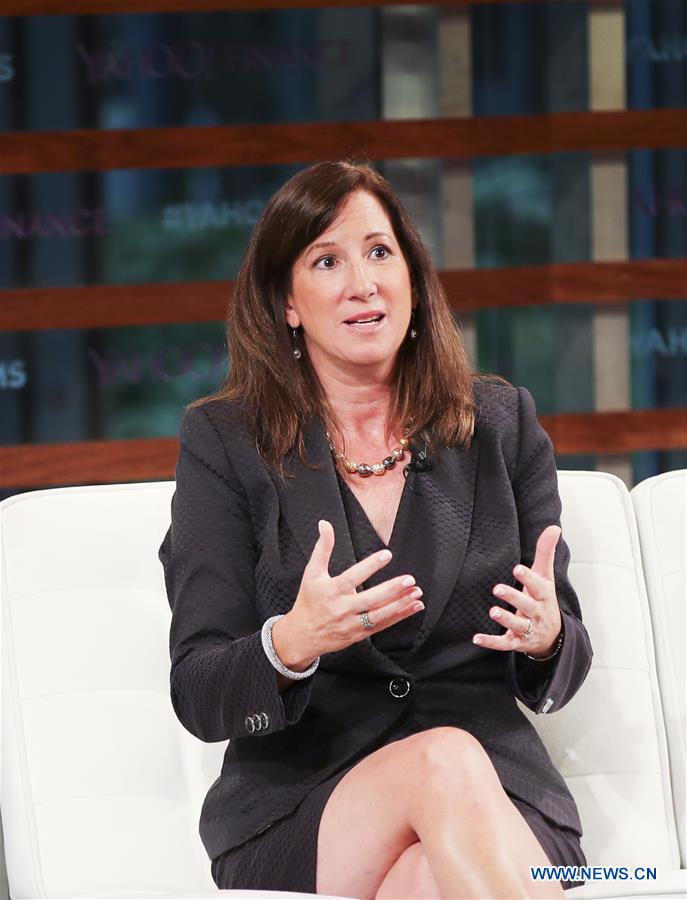
Cathy Engelbert, CEO of Deloitte, speaks during Yahoo Finance All Markets Summit in New York, the United States, Sept. 20, 2018. The U.S. economy stands to be hurt in the long term by the imposition of unilateral tariffs on its major trading partners including Mexico, Canada and China as the punitive measures are always the last resort in dealing with trade disputes, business leaders said. TO GO WITH Spotlight: Business leaders say U.S. to be hurt in long term by unilateral tariffs (Xinhua/Wang Ying)
by Xinhua writers Yang Shilong, Li Feihu
NEW YORK, Sept. 20 (Xinhua) -- The U.S. economy stands to be hurt in the long term by the imposition of unilateral tariffs on its major trading partners including Mexico, Canada and China as the punitive measures are always the last resort in dealing with trade disputes, business leaders said.
"Obviously tariffs should be the last resort," said Cathy Engelbert, CEO of Deloitte, when asked about the U.S. tariffs battle with its trading partners at Yahoo Finance's second annual All Markets Summit held here Thursday.
The U.S. move "affects a lot of different things," "the cost of productions will be going up, companies don't have time to change supply chains," said Engelbert.
A lot of jobs will be affected too. "One in five American jobs are related to import and export trade. It's really an important issue raised up here," said the chief of one of the Big Four accounting firms.
In a statement issued Monday, U.S. President Donald Trump announced that his government would impose 10-percent tariffs on roughly 200 billion U.S. dollars' worth of imports from China starting on Sept. 24, and expand the levy to 25 percent beginning Jan. 1.
Larry Fink, CEO of BlackRock, believes the United States is "a big winner" in the tariffs spat with its trading partners only "in the short run."
The latest report by the American Action Forum, a Washington-based nonprofit issue advocacy organization, showed that the upcoming tariffs could raise overall costs for both U.S. consumers and businesses by roughly 19.7 billion dollars per year.
"In the short run, the United States is a big winner," said Fink in his talk with Andy Serwer, editor-in-chief of Yahoo Finance. BlackRock's 6.3 trillion U.S. dollar assets under management make the New York-based firm one of the most influential voices in investing worldwide.
"If you look at what is being proposed in NAFTA in the short run, it looks like it's beneficial for the United States. What is being negotiated with Canada, in the short run it looks good. All the actions with China in the short run, it's good," he said.
"What I'm worried about is the long term," said Fink. "In the long run, does the U.S. behaviors impair the world vitality?"
The head of the world's largest asset manager said that business and political leaders in Europe and Asia he has met are concerned by the U.S. unilateralism.
"Does it change relationships, does it change allies, does it change the course of how we resolve problems?" Fink said.
He said the world is economically less safe as multilateralism is breaking down and populism is rising, which "create more volatility and greater problems."
In a letter to the U.S. Trade Representative by 150 industrial associations earlier this month, the organizations representing agriculture, retailers, manufacturers, technology and other industries said that "continuing the tit-for-tat tariff escalation with China only serves to expand the harm to more U.S. economic interests, including farmers, families, businesses and workers."
Kewsong Lee, co-CEO of The Carlyle Group, said his company does not have a plan to change its strategy in China though they are keeping a close eye on the escalating trade tensions between the United States and China.
"We're quite bullish on opportunities in China over the long term," said Lee. "There are lots of great investment opportunities there."
The Washington D.C.-based group is a prominent private equity firm with more than 200 billion U.S. dollars of assets under management. It has 10 percent of its assets exposed to China.
Noting that China is "a great partner," Lee said: "It's very important to the global economy for China to continue to grow."











